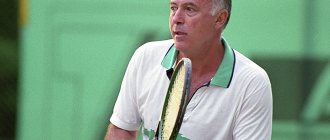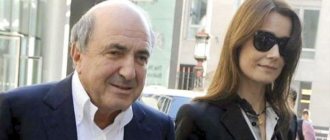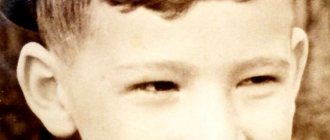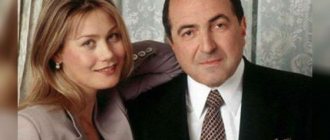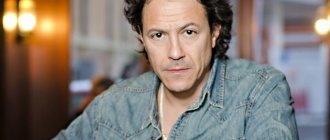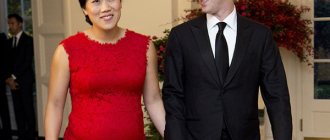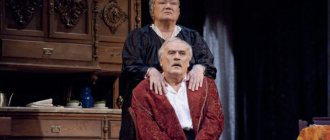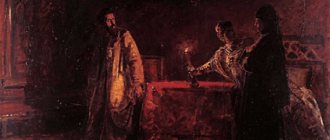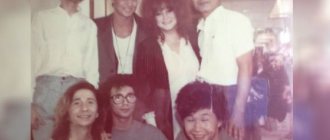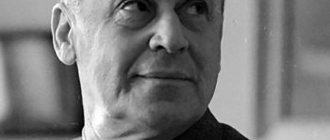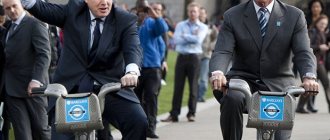The childhood of Boris Nemtsov
Boris's homeland is the city of Sochi. The boy’s mother was a pediatrician, and his father worked as a deputy construction director. After spending his childhood on the seashore, he went to the city of Gorky to study.
Boris Nemtsov in his youth
Boris entered the university at the Faculty of Radiophysics, which he graduated in 1981. After university, he was assigned to the city's radio engineering research institute, where he defended his dissertation. As a scientist, Nemtsov showed great promise and could have defended his doctorate if he wanted, but even at that time he was more interested in politics rather than science.
The childhood and youth of Boris Nemtsov
The biography of Boris Nemtsov began on October 9, 1959. It was on this day that Efim Davidovich Nemtsov and Dina Yakovlevna Eidman were delighted with the birth of their son. Bori's father was a civil servant, and his mother was a doctor.
For the first 8 years, the future politician lived in Sochi, in the city that became home to him. Then, after his parents’ divorce, the boy and his mother moved to Nizhny Novgorod, which was then called Gorky.
After the divorce, Efim Davidovich did not stop caring for his former family, provided financial support and often spent time with his son, taking him to Moscow.
Education
Already in childhood, Boris showed a craving for exact sciences. A serious attitude to the educational process allowed the young man to graduate from school with a gold medal. Nemtsov received his higher education at Gorky State University - in 1981 he received a diploma in radiophysics engineer.
Having been assigned to the Gorky Radio Engineering Research Institute, the young specialist continued to improve his level of knowledge, and after defending his dissertation, he was awarded the scientific degree of Candidate of Physical and Mathematical Sciences.
The beginning of the career of Boris Nemtsov
In 1988, Boris's mother led the movement against the launch of a nuclear power plant in Gorky. Nemtsova, as a doctor, understood the dangers of radiation, because she more than once treated people with leukemia. Boris actively joined this movement. As Boris later admitted in interviews, it was his mother who drew him into politics.
Boris Nemtsov at the beginning of his career
Soon the young scientist became so popular that in 1989 he was nominated as a candidate for deputy of the USSR. Then his career progressed rapidly. In 1990 he became a deputy of the RSFSR in the Gorky district.
The putsch, which occurred in August 1991, played an important role in Nemtsov’s political fate. In those days, quite by chance, he ended up in the capital, spending a vacation there with his family. Nemtsov could not stand aside and took part in the defense of the White House, supporting Boris Yeltsin, who later did not forget this.
Boris Nemtsov was on good terms with Yeltsin
Career rise: Nemtsov - governor
Good personal relationships with Boris Nikolaevich helped Nemtsov make a quick career - he became the president’s confidant in the Nizhny Novgorod region, a few months later he already headed the regional administration, then governor, and almost two years later also a parliamentarian.
In the Federation Council he was a representative of the Nizhny Novgorod region. The politician enjoyed trust and popularity in his area, thanks to which he won the gubernatorial elections again. This was in 1995. However, there were excesses in his career. So, live on air with Vladimir Zhirinovsky, after heated arguments, politicians began pouring juice on each other and throwing glasses. After this incident, Nemtsov’s popularity only increased. The press called the politician one of the most independent and independent regional leaders.
Zhirinovsky pours juice on Nemtsov
Boris Nemtsov's work in Moscow
He left the governor's post in 1997, becoming the first deputy prime minister of the Federal Government.
His responsibilities included overseeing housing and communal services, the social sector and construction; he controlled antimonopoly policy and natural monopolies. From April to November 1997, Nemtsov also simultaneously served as Minister of Fuel and Industry, becoming the youngest minister in the government. Many still remember the advertised initiative to transfer all officials to domestic Volga cars, which never yielded any results.
Boris Nemtsov answers a pressing question In the spring of 1998, the politician was transferred to the financial and economic bloc. The August default affected the politician’s position; he became acting Deputy Prime Minister of Russia.
Boris Nemtsov's departure from the government
According to Nemtsov, the transition to the government turned out to be a big mistake - he lost the opportunity to move on. The politician resigned and directed his efforts to create the Young Russia movement. A little later, it joined the Union of Right Forces (SPS), from which the politician became a State Duma deputy and received the post of deputy chairman in the lower house of parliament. After Nemtsov, this post was taken by Irina Khakamada.
Nemtsov knew how to lead people
In 2000, Nemtsov became the head of the Duma faction. The Union of Right Forces lost the Duma elections in 2003. Nemtsov took the blame for this loss upon himself. The politician decided to go into business. At the Neftyanoy concern, he took the post of chairman of the board of directors.
Biography of Boris Nemtsov
Together with Grigory Yavlinsky, he developed a program of economic reforms for the Nizhny Novgorod region. In 1992, the International Biographical Center for Intellectuals at the University of Cambridge was recognized as “Person of the Year” and included in the list of “200 world leaders of the next century.”
In December 1993, he was elected to the Federation Council of the Federal Assembly of the Russian Federation from the Nizhny Novgorod region, and was a member of the committee on budget, financial, currency and credit regulation, money issue, tax policy and customs regulation.
On December 17, 1995, Boris Nemtsov was re-elected governor for a second term, gaining 58.37 percent of the votes in the first round. In 1996, he was re-elected as a member of the Federation Council and was deputy chairman of the committee on social policy.
On March 17, 1997, by decree of Russian President Boris Yeltsin, he was appointed First Deputy Prime Minister of the Russian Federation Viktor Chernomyrdin. Oversaw the social block, housing and communal services and construction, and antimonopoly policy. From April 24 to November 20, 1997 - First Deputy Prime Minister - Minister of Fuel and Energy of the Russian Federation. He was a member of the Security Council, deputy chairman of the government commission on operational issues.
In the government of Sergei Kiriyenko, from April 28 to August 28, 1998, he served as Deputy Chairman of the Government, overseeing the financial and economic block. Was dismissed after default on August 17, 1998.
In December 1998, he founded and became chairman of the all-Russian political public movement “Young Russia”. In August 1999, the movement became part of the electoral bloc (since 2001, the party) “Union of Right Forces” (SPS).
On December 19, 1999, he was elected to the State Duma of the Russian Federation of the third convocation in the 117th Avtozavodsky single-mandate electoral district of Nizhny Novgorod /39.8 percent of the votes/. In 2000, he served as Deputy Chairman of the State Duma Gennady Seleznev. In 2000-2003 headed the SPS faction. Until 2004, he was one of the leaders of the SPS party (together with Irina Khakamada, Yegor Gaidar and Anatoly Chubais). In 2004, he resigned as co-chairman of the party. He was a member of the political council of the Union of Right Forces.
After the defeat of the Union of Right Forces in the State Duma elections in 2003, in February 2004 he took the post of chairman of the board of directors of the Neftyanoy concern, leaving there a year later. In 2004, he became one of the founders of the “Committee 2008: Free Choice”, headed by Garry Kasparov.
He took part in protests in Kyiv during the “Orange Revolution” of 2004. After the election of Viktor Yushchenko as President of Ukraine in 2005-2006. was his freelance advisor.
In September 2007, he entered the top three list of candidates for the State Duma elections from the Union of Right Forces, but the party did not enter parliament (0.96%).
On December 17, 2007, at the congress of the Union of Right Forces, he was nominated as a candidate for the post of President of Russia, but on December 26, he refused to participate in the elections in favor of Mikhail Kasyanov as the sole candidate from the democratic opposition (in January 2008, the Central Election Commission refused to register Kasyanov).
In February 2008, Boris Nemtsov announced the suspension of membership in the Union of Right Forces (the party was dissolved in November).
Boris Nemtsov: the last years of his life
In 2004, Boris Nemtsov openly supported the Orange Revolution that took place in Ukraine, after which he became an unofficial adviser to the Ukrainian president.
Boris has always spoken openly about his beliefs
To participate in the Russian presidential elections in 2008, the Union of Right Forces nominated Boris Efimovich, but his rating was less than one percent. Nemtsov withdrew his candidacy even before the start of the campaign. That same year, the politician announced the termination of his membership in the Union of Right Forces.
In the fall of 2008, the Union of Right Forces was dissolved, and at the same time a new Right Cause party was organized. Nemtsov was against the dissolution of the Union of Right Forces; he did not want to participate in Right Cause. Instead, he became one of the founders of the opposition democratic movement Solidarity.
Boris Nemtsov on Elbrus
In 2009, the politician nominated himself for the post of mayor of Sochi. Many considered this a PR campaign. In the elections, Nemtsov took second place, gaining slightly less than fourteen percent.
In 2012, Boris Nemtsov became co-chairman of the political party “Republican Party of Russia - People's Freedom Party” (RPR-PARNAS). From this party he nominated his candidacy in the elections to the Yaroslavl Regional Duma on September 8, 2013 and was elected as a deputy.
Nemtsov was not afraid to criticize the current government
Boris Nemtsov openly criticized Vladimir Putin’s policies, becoming the author of anti-corruption reports: “Putin. Results. 10 years”, “Putin. Corruption". He was also one of the initiators and an active participant in the “March of Dissent” in 2007, “Strategy-31”, protest rallies “For Fair Elections” in 2011-2013 and marches against military operations in Ukraine (2014-2015).
Nemtsov in opposition
Nemtsov began his independent political career in the Union of Right Forces party together with Irina Khakamada and Sergei Kiriyenko. In 1999, they supported Putin when he was appointed prime minister. He later admitted that this decision was wrong.
In the elections to the State Duma he won in one of the districts in Nizhny Novgorod.
At the next elections in 2003, he ran at the head of the list of the Union of Right Forces. But the party was unable to overcome the 5 percent threshold required to enter parliament. After losing the election, Nemtsov resigned as leader of the Union of Rightist Forces.
After this, his political career developed rapidly, he was always in the public eye. For the 2008 presidential elections, the Union of Right Forces nominated him as a candidate for president of Russia, but he refused, supporting Mikhail Kasyanov. In 2009, he participated in the mayoral elections of Sochi. He took second place with about 13.5% of the votes.
Since 2010, he has regularly participated in non-systemic opposition rallies and has been repeatedly detained for participating in unauthorized political actions. The author of a number of expert reports is “Putin. Results", "Putin. Corruption", "Putin. Life of a galley slave. Palaces, yachts, cars, planes and other accessories”, “Winter Olympics in the subtropics” and others.
In 2013, he won the elections to the Yaroslavl Regional Duma from the RPR-Parnas party.
Personal life of Boris Nemtsov
The politician’s first and only official wife, Raisa Akhmetovna Nemtsova, is not a public person. This marriage gave Nemtsov a daughter, Zhanna, who was able to become an independent and significant figure. She is known as a talented journalist, public figure and TV presenter (from 2007 to 2020 she worked on the RBC TV channel).
First wife Raisa, Boris Nemtsov and their daughter Zhanna
Boris Efimovich has a son and a daughter, whom journalist Ekaterina Odintsova gave birth to. He met her in Nizhny Novgorod. Son Anton was born in 1995, and daughter Diana in 2002.
“Nemtsov with his common-law wife Ekaterina Odintsova, son Anton and daughter Dina
In 2004, the politician became a father for the fourth time: his secretary Irina Koroleva, who previously worked in the Administration of the President of the Russian Federation, gave birth to his daughter Sofia.
Irina Koroleva with her daughter Sofia
Personal life
Boris Efimovich was married. He and his wife Raisa Akhmetovna lived separately during the last years of their marriage. Raisa Akhmetovna worked as a librarian. From this marriage, Nemtsov has a daughter, Zhanna (born in 1984). In 2005, the girl decided to follow in her father’s footsteps and ran for election to the Moscow City Duma. Despite support from five political parties, Zhanna lost the election.
With his wife Raisa | Evening Moscow
Nemtsov also has children from journalist Ekaterina Odintsova: son Anton, daughter Dina. In 2004, a daughter, Sofia, was born from Irina Koroleva, who served as his secretary.
With Ekaterina Odintsova |
Another of Nemtsov’s lovers was Anastasia Ogneva, whom the politician met in 2012. He dated her for more than three years.
Many accused Nemtsov of excessive attention to representatives of the fair half of humanity, but he repeatedly stated that his women always simply loved him, and men were jealous of this state of affairs.
With Anna Duritskaya
The politician’s last love was the Ukrainian model Anna Duritskaya.
Nemtsov loved sports. In his free time, he loved to play tennis, which he had been doing since 1979, and was fond of windsurfing.
Death of Boris Nemtsov
On the night of February 27–28, 2020, Boris Nemtsov was shot dead in Moscow, near Vasilyevsky Spusk.
Unknown killers shot the politician four times in the back. He died on the spot from his injuries. He was 55 years old. At the time of his death, Nemtsov was walking with his friend, model Anna Duritskaya.
The girl was not injured in any way as a result. It was not possible to detain the criminals in hot pursuit. Khakamada suggested who might benefit from Nemtsov’s death. Boris Nemtsov was buried on March 3 at the Troekurovskoye cemetery, where the funeral service had previously taken place. The farewell and civil memorial service took place at the Sakharov Center.
